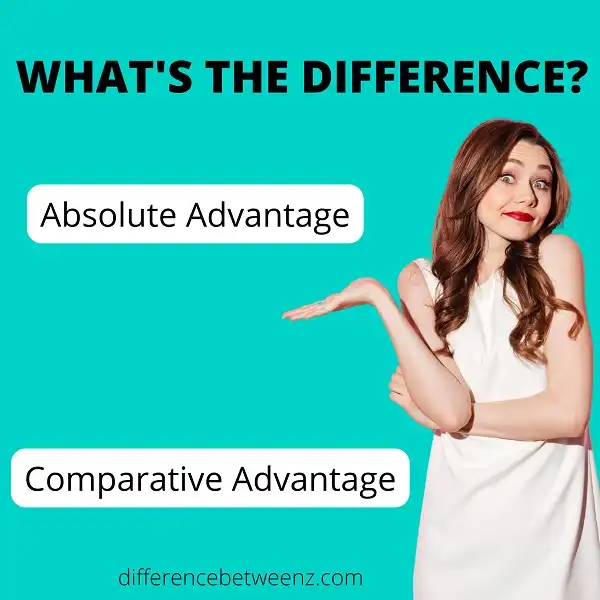What is the difference between absolute and comparative advantage? Many people confuse the two, but they are actually quite different. Absolute advantage is when a country can produce more of a good or service than another country, regardless of the cost. Comparative advantage is when a country can produce a good or service at a lower cost than another country. Understanding these concepts is important for understanding international trade.
What is an Absolute Advantage?
Absolute advantage is an economic term that describes the ability of a producer to produce a good or service more efficiently than another producer. In other words, the producer has a lower opportunity cost for producing the good or service. The concept of absolute advantage is important in international trade because it can help to determine which countries have a comparative advantage in producing certain goods or services. For example, if Country A can produce 10 units of wheat per hour and Country B can only produce 5 units of wheat per hour, then Country A has an absolute advantage in wheat production.
This means that Country A can produce wheat more efficiently than Country B and can therefore sell wheat to Country B at a lower price. As a result, both countries can benefit from trade by specializing in the production of the goods and services in which they have an absolute advantage. There are several different theories about how absolute advantage affects international trade, but the concept remains one of the most important ideas in economics.
What is Comparative Advantage?
Comparative advantage is an economic theory that describes the benefits of specialization. It is the idea that a country can produce a good or service at a lower opportunity cost than another country. Comparative advantage is based on the idea of absolute advantage, which is the ability to produce a good or service more efficiently than another country. Comparative advantage is a more sophisticated idea because it recognizes that countries may have different opportunity costs.
For example, one country may have an absolute advantage in the production of both wheat and cloth, but a comparative advantage in the production of wheat. This means that the country can produce wheat at a lower opportunity cost than any other country, and cloth at a lower opportunity cost than any other country except for one that has a lower opportunity cost for cloth. Comparative advantage is the basis for international trade, and it is often used to explain why countries specialize in the production of certain goods and services.
Difference between Absolute and Comparative Advantage
The terms “absolute advantage” and “comparative advantage” are often used interchangeably, but they actually refer to two different concepts. Absolute advantage refers to the ability of a country to produce a good or service more efficiently than any other country. Comparative advantage, on the other hand, refers to the ability of a country to produce a good or service at a lower opportunity cost than any other country. In other words, a country has a comparative advantage in the production of a good or service if it can produce that good or service at a lower relative price than any other country.
The concepts of absolute and comparative advantage are important in international trade because they help to explain why countries specialize in the production of certain goods and services. Countries with an absolute advantage in the production of a particular good or service will tend to specialize in that good or service and export it to other countries. Similarly, countries with a comparative advantage in the production of a particular good or service will tend to specialize in that good or service and export it to other countries.
Conclusion
Understanding the difference between absolute and comparative advantage is key to understanding why countries trade with each other. Absolute advantage occurs when a country can produce a good or service at a lower cost than another country. Comparative advantage, on the other hand, happens when a country can produce a good or service at a lower opportunity cost than another country. When countries trade based on their comparative advantages, both parties benefit from the exchange.


